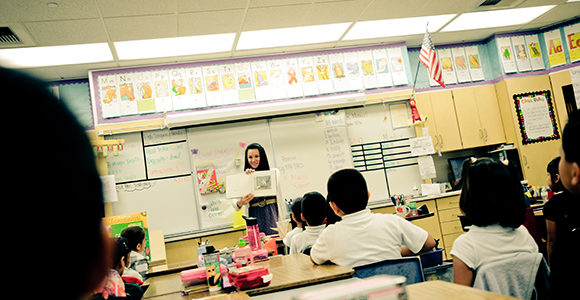
(Photo Credit: Violeta Vaqueiro)
California’s public institutions including its schools are facing fiscal pressures requiring them to control costs and improve results. And civic engagement and public understanding are both critical to improving education in the state. That’s one reason why Marshall Tuck, Educator in Residence at the New Teacher Center, is one of the California political figures participating in a series of bipartisan conversations across California.
He is being joined by Pete Peterson, executive director of the Davenport Institute for Public Engagement and Civic Leadership at Pepperdine University; Fresno Mayor Ashley Swearengin, and former San Jose Mayor Chuck Reed.
The conversations are open to the public–in fact we’d like the public to participate–to discuss some of the most pressing issues facing our cities, counties and our school.
The event is called: “Money, Schools, Jobs and You – A Bipartisan Conversation.” The first of these will be held in San Jose on August 19. The second is scheduled for September 29 in Clovis. Registration is free.
We posed some questions for the lead participants. Here are Tuck’s thoughts on the importance of the events:
CA Fwd: Why did you agree to participate in these bipartisan conversations?
Marshall Tuck: “I believe deeply that every child deserves a quality education and I am committed to doing my part to help our State improve our schools. Whenever I have the opportunity to be a part of a diverse group coming together to discuss improving the lives of children, I take it. The fact that I get to learn more about job creation, civic engagement and fiscal sustainability from some very talented people is a nice added bonus.”
CA Fwd: Who do you hope will participate?
Tuck: “Hopefully as many people as possible: Civic leaders, business leaders, community leaders, community members, parents and students. We all have to take responsibility for improving California’s schools and we have to work together to get this done. The more people engaged the better for our kids.”
CA Fwd: A lot of stories on California politics play up a fight between groups. Can California become a model for collaboration? How can that happen?
Tuck: “Absolutely. There are great examples both in California’s history and in California today of people and groups coming together and collaborating to drive huge impact. We’ve created the greatest public university system in the world; we’ve built up the Silicon Valley, the innovation and creativity capital of the world; our entertainment industry in Southern California is like nowhere else; our agricultural industry in the Central Valley is world class. These things wouldn’t have happened without real collaboration. We need to continually highlight what has worked in this state, learn from it, and do more of it. If we bring the same energy, urgency, innovation, and collaboration to solving key social issues in California that we have brought to many of our State’s great successes, we will make significant progress.”
CA Fwd: Seems like one area of concern or emphasis is how we get more people paying attention to participating in the electoral process–How can we improve that?
Tuck: “I’ll give you a few ideas here but ultimately people will have to join the conversation on August 19th to get the full answer. We have to increase civic engagement and I believe there has to be a comprehensive effort to get this done. In schools, we should teach civics in elementary school and middle school rather than waiting for a student’s senior year in high school to teach about political engagement. When I was running for State Superintendent, I met a high school student who had just turned 18 and told me he thought it was crazy that he was being asked to vote but wasn’t going to be taught civics until his last semester in high school. Technology can also help because candidates and advocacy organizations can get information out about issues, candidates, and elections much more efficiently today using technology. The messages of course must be compelling and relevant for people to pay attention. And the messages have to be more aspirational. When most of the communications in campaigns is negative, it just turns a lot of people off. Californians are aspirational and we need a lot more positive, aspirational campaigning.”
CA Fwd: Of the other issues you expect to discuss in addition to increasing public participation–issues like having the triple bottom line approach to job creation, the state’s fiscal sustainability and government accountability–we tend to look at them issues separately. How they all are connected?
Tuck: “Ultimately, I think most policy areas are inter-connected in some ways. Unless we have a well-educated work force in California, there won’t be much quality job creation. Without continued job creation we won’t have a growing revenue base in California and our fiscal sustainability will be constrained. Without government accountability, the likelihood that we will be as effective as possible at improving schools and creating jobs is much less. Looking at these areas separately guarantees less progress than if we recognize that they are interconnected.”
CA Fwd: What do you think should/can come out of these “conversations?”
Tuck: “I hope that these conversations can help move the ball forward for kids and for California. We have a lot of work to do but I am confident that we can come together and make meaningful progress on the big issues facing our State in the coming years. I hope that attendees of the conversations leave a little more optimistic about California’s future and a little more committed to taking action civically to help California thrive.”

